Organisational Behaviour Concepts & Application at Sainsbury's UK
VerifiedAdded on 2023/06/05
|14
|4640
|252
Report
AI Summary
This report provides an in-depth analysis of organisational behaviour within Sainsbury's, a leading UK supermarket chain. It explores how organisational culture, power dynamics, and workplace politics influence individual performance, referencing Handy's Culture Model and various classifications of power and politics. The report further discusses the use of motivational theories, including Maslow's hierarchy of needs and Vroom's expectancy theory, to enhance employee productivity and achieve organisational goals. Additionally, it touches upon the characteristics of effective teams and the application of organisational behaviour concepts within Sainsbury's business context. The analysis aims to provide a comprehensive understanding of how these elements interact to impact business performance and productivity within the organisation.
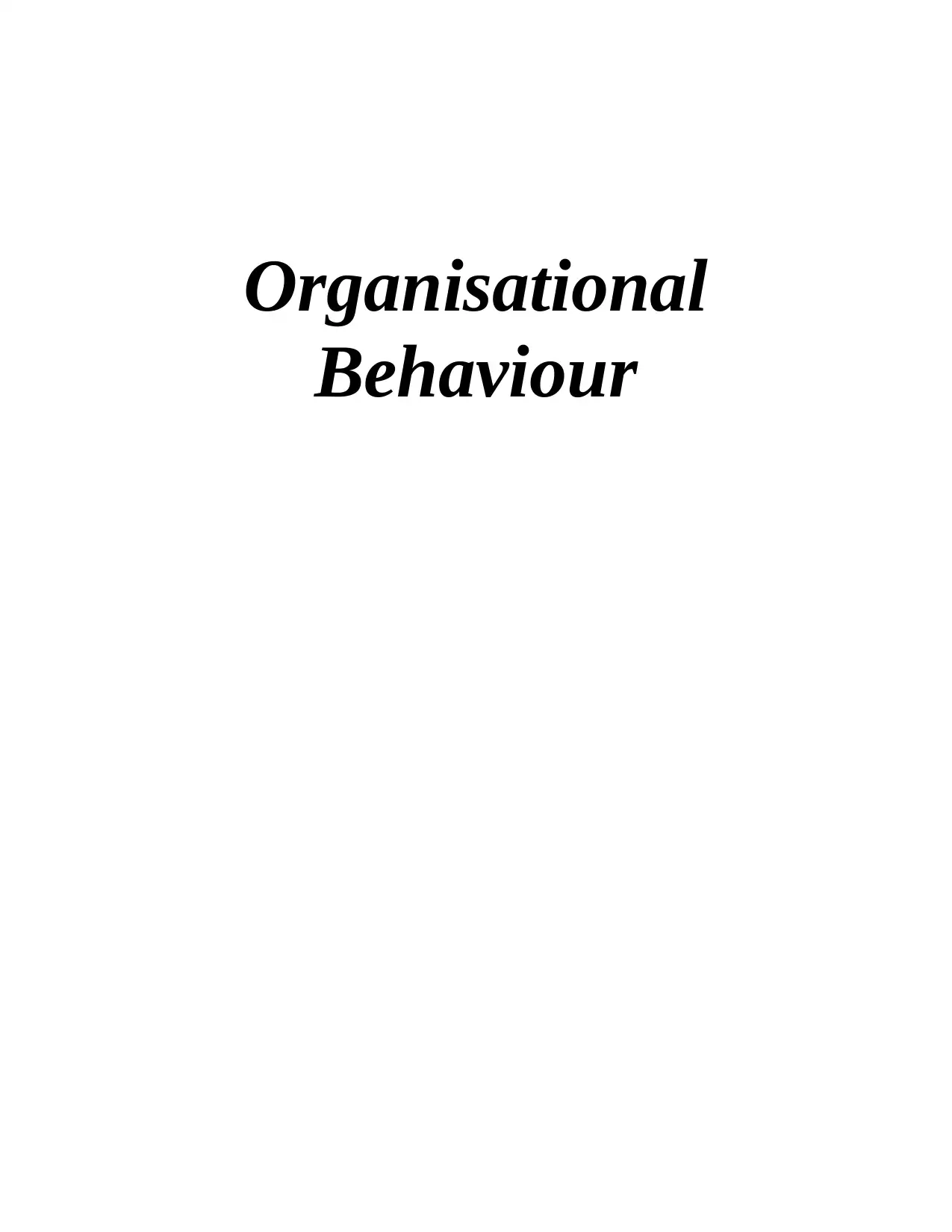
Organisational
Behaviour
Behaviour
Paraphrase This Document
Need a fresh take? Get an instant paraphrase of this document with our AI Paraphraser
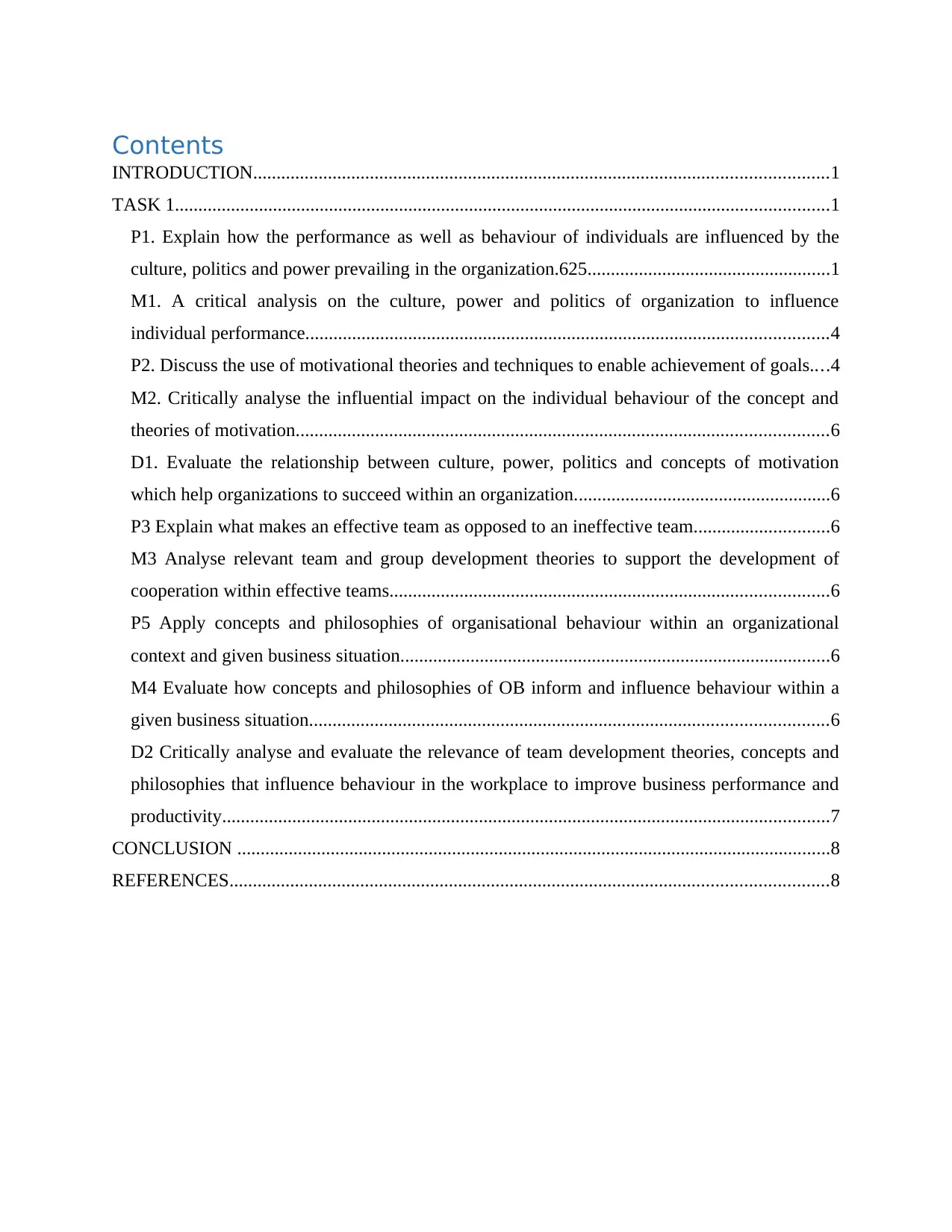
Contents
INTRODUCTION...........................................................................................................................1
TASK 1............................................................................................................................................1
P1. Explain how the performance as well as behaviour of individuals are influenced by the
culture, politics and power prevailing in the organization.625....................................................1
M1. A critical analysis on the culture, power and politics of organization to influence
individual performance................................................................................................................4
P2. Discuss the use of motivational theories and techniques to enable achievement of goals....4
M2. Critically analyse the influential impact on the individual behaviour of the concept and
theories of motivation..................................................................................................................6
D1. Evaluate the relationship between culture, power, politics and concepts of motivation
which help organizations to succeed within an organization.......................................................6
P3 Explain what makes an effective team as opposed to an ineffective team.............................6
M3 Analyse relevant team and group development theories to support the development of
cooperation within effective teams..............................................................................................6
P5 Apply concepts and philosophies of organisational behaviour within an organizational
context and given business situation............................................................................................6
M4 Evaluate how concepts and philosophies of OB inform and influence behaviour within a
given business situation...............................................................................................................6
D2 Critically analyse and evaluate the relevance of team development theories, concepts and
philosophies that influence behaviour in the workplace to improve business performance and
productivity..................................................................................................................................7
CONCLUSION ...............................................................................................................................8
REFERENCES................................................................................................................................8
INTRODUCTION...........................................................................................................................1
TASK 1............................................................................................................................................1
P1. Explain how the performance as well as behaviour of individuals are influenced by the
culture, politics and power prevailing in the organization.625....................................................1
M1. A critical analysis on the culture, power and politics of organization to influence
individual performance................................................................................................................4
P2. Discuss the use of motivational theories and techniques to enable achievement of goals....4
M2. Critically analyse the influential impact on the individual behaviour of the concept and
theories of motivation..................................................................................................................6
D1. Evaluate the relationship between culture, power, politics and concepts of motivation
which help organizations to succeed within an organization.......................................................6
P3 Explain what makes an effective team as opposed to an ineffective team.............................6
M3 Analyse relevant team and group development theories to support the development of
cooperation within effective teams..............................................................................................6
P5 Apply concepts and philosophies of organisational behaviour within an organizational
context and given business situation............................................................................................6
M4 Evaluate how concepts and philosophies of OB inform and influence behaviour within a
given business situation...............................................................................................................6
D2 Critically analyse and evaluate the relevance of team development theories, concepts and
philosophies that influence behaviour in the workplace to improve business performance and
productivity..................................................................................................................................7
CONCLUSION ...............................................................................................................................8
REFERENCES................................................................................................................................8
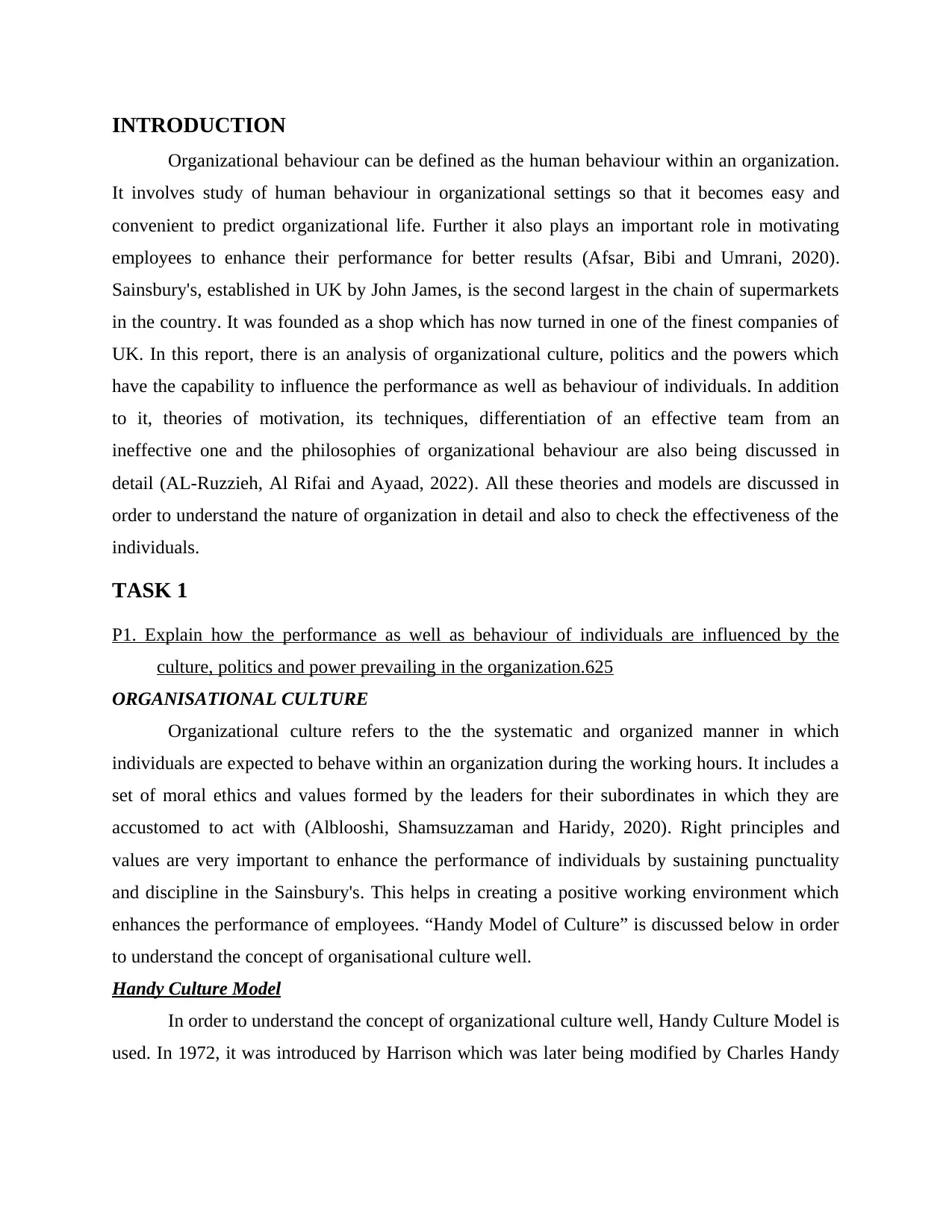
INTRODUCTION
Organizational behaviour can be defined as the human behaviour within an organization.
It involves study of human behaviour in organizational settings so that it becomes easy and
convenient to predict organizational life. Further it also plays an important role in motivating
employees to enhance their performance for better results (Afsar, Bibi and Umrani, 2020).
Sainsbury's, established in UK by John James, is the second largest in the chain of supermarkets
in the country. It was founded as a shop which has now turned in one of the finest companies of
UK. In this report, there is an analysis of organizational culture, politics and the powers which
have the capability to influence the performance as well as behaviour of individuals. In addition
to it, theories of motivation, its techniques, differentiation of an effective team from an
ineffective one and the philosophies of organizational behaviour are also being discussed in
detail (AL-Ruzzieh, Al Rifai and Ayaad, 2022). All these theories and models are discussed in
order to understand the nature of organization in detail and also to check the effectiveness of the
individuals.
TASK 1
P1. Explain how the performance as well as behaviour of individuals are influenced by the
culture, politics and power prevailing in the organization.625
ORGANISATIONAL CULTURE
Organizational culture refers to the the systematic and organized manner in which
individuals are expected to behave within an organization during the working hours. It includes a
set of moral ethics and values formed by the leaders for their subordinates in which they are
accustomed to act with (Alblooshi, Shamsuzzaman and Haridy, 2020). Right principles and
values are very important to enhance the performance of individuals by sustaining punctuality
and discipline in the Sainsbury's. This helps in creating a positive working environment which
enhances the performance of employees. “Handy Model of Culture” is discussed below in order
to understand the concept of organisational culture well.
Handy Culture Model
In order to understand the concept of organizational culture well, Handy Culture Model is
used. In 1972, it was introduced by Harrison which was later being modified by Charles Handy
Organizational behaviour can be defined as the human behaviour within an organization.
It involves study of human behaviour in organizational settings so that it becomes easy and
convenient to predict organizational life. Further it also plays an important role in motivating
employees to enhance their performance for better results (Afsar, Bibi and Umrani, 2020).
Sainsbury's, established in UK by John James, is the second largest in the chain of supermarkets
in the country. It was founded as a shop which has now turned in one of the finest companies of
UK. In this report, there is an analysis of organizational culture, politics and the powers which
have the capability to influence the performance as well as behaviour of individuals. In addition
to it, theories of motivation, its techniques, differentiation of an effective team from an
ineffective one and the philosophies of organizational behaviour are also being discussed in
detail (AL-Ruzzieh, Al Rifai and Ayaad, 2022). All these theories and models are discussed in
order to understand the nature of organization in detail and also to check the effectiveness of the
individuals.
TASK 1
P1. Explain how the performance as well as behaviour of individuals are influenced by the
culture, politics and power prevailing in the organization.625
ORGANISATIONAL CULTURE
Organizational culture refers to the the systematic and organized manner in which
individuals are expected to behave within an organization during the working hours. It includes a
set of moral ethics and values formed by the leaders for their subordinates in which they are
accustomed to act with (Alblooshi, Shamsuzzaman and Haridy, 2020). Right principles and
values are very important to enhance the performance of individuals by sustaining punctuality
and discipline in the Sainsbury's. This helps in creating a positive working environment which
enhances the performance of employees. “Handy Model of Culture” is discussed below in order
to understand the concept of organisational culture well.
Handy Culture Model
In order to understand the concept of organizational culture well, Handy Culture Model is
used. In 1972, it was introduced by Harrison which was later being modified by Charles Handy
⊘ This is a preview!⊘
Do you want full access?
Subscribe today to unlock all pages.

Trusted by 1+ million students worldwide
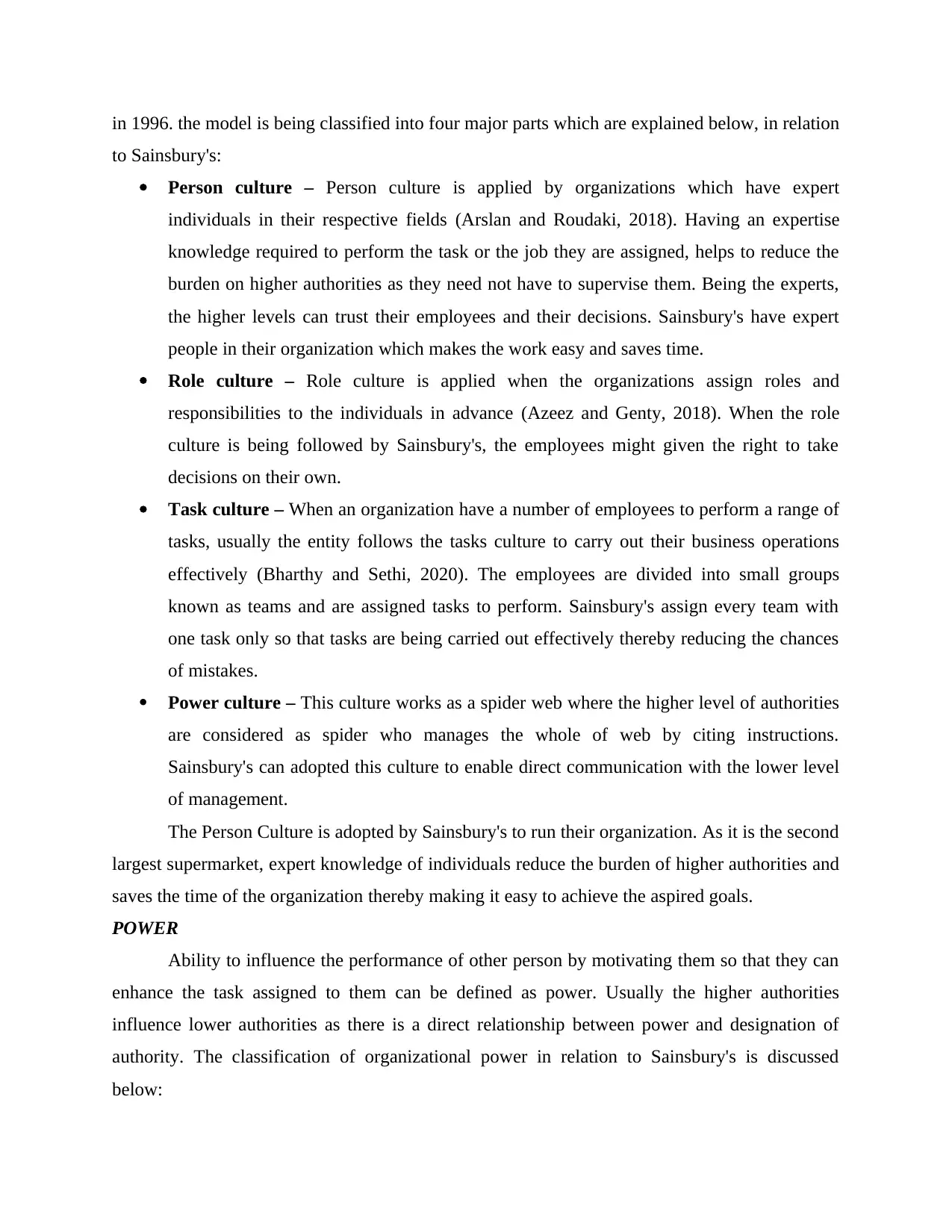
in 1996. the model is being classified into four major parts which are explained below, in relation
to Sainsbury's:
Person culture – Person culture is applied by organizations which have expert
individuals in their respective fields (Arslan and Roudaki, 2018). Having an expertise
knowledge required to perform the task or the job they are assigned, helps to reduce the
burden on higher authorities as they need not have to supervise them. Being the experts,
the higher levels can trust their employees and their decisions. Sainsbury's have expert
people in their organization which makes the work easy and saves time.
Role culture – Role culture is applied when the organizations assign roles and
responsibilities to the individuals in advance (Azeez and Genty, 2018). When the role
culture is being followed by Sainsbury's, the employees might given the right to take
decisions on their own.
Task culture – When an organization have a number of employees to perform a range of
tasks, usually the entity follows the tasks culture to carry out their business operations
effectively (Bharthy and Sethi, 2020). The employees are divided into small groups
known as teams and are assigned tasks to perform. Sainsbury's assign every team with
one task only so that tasks are being carried out effectively thereby reducing the chances
of mistakes.
Power culture – This culture works as a spider web where the higher level of authorities
are considered as spider who manages the whole of web by citing instructions.
Sainsbury's can adopted this culture to enable direct communication with the lower level
of management.
The Person Culture is adopted by Sainsbury's to run their organization. As it is the second
largest supermarket, expert knowledge of individuals reduce the burden of higher authorities and
saves the time of the organization thereby making it easy to achieve the aspired goals.
POWER
Ability to influence the performance of other person by motivating them so that they can
enhance the task assigned to them can be defined as power. Usually the higher authorities
influence lower authorities as there is a direct relationship between power and designation of
authority. The classification of organizational power in relation to Sainsbury's is discussed
below:
to Sainsbury's:
Person culture – Person culture is applied by organizations which have expert
individuals in their respective fields (Arslan and Roudaki, 2018). Having an expertise
knowledge required to perform the task or the job they are assigned, helps to reduce the
burden on higher authorities as they need not have to supervise them. Being the experts,
the higher levels can trust their employees and their decisions. Sainsbury's have expert
people in their organization which makes the work easy and saves time.
Role culture – Role culture is applied when the organizations assign roles and
responsibilities to the individuals in advance (Azeez and Genty, 2018). When the role
culture is being followed by Sainsbury's, the employees might given the right to take
decisions on their own.
Task culture – When an organization have a number of employees to perform a range of
tasks, usually the entity follows the tasks culture to carry out their business operations
effectively (Bharthy and Sethi, 2020). The employees are divided into small groups
known as teams and are assigned tasks to perform. Sainsbury's assign every team with
one task only so that tasks are being carried out effectively thereby reducing the chances
of mistakes.
Power culture – This culture works as a spider web where the higher level of authorities
are considered as spider who manages the whole of web by citing instructions.
Sainsbury's can adopted this culture to enable direct communication with the lower level
of management.
The Person Culture is adopted by Sainsbury's to run their organization. As it is the second
largest supermarket, expert knowledge of individuals reduce the burden of higher authorities and
saves the time of the organization thereby making it easy to achieve the aspired goals.
POWER
Ability to influence the performance of other person by motivating them so that they can
enhance the task assigned to them can be defined as power. Usually the higher authorities
influence lower authorities as there is a direct relationship between power and designation of
authority. The classification of organizational power in relation to Sainsbury's is discussed
below:
Paraphrase This Document
Need a fresh take? Get an instant paraphrase of this document with our AI Paraphraser
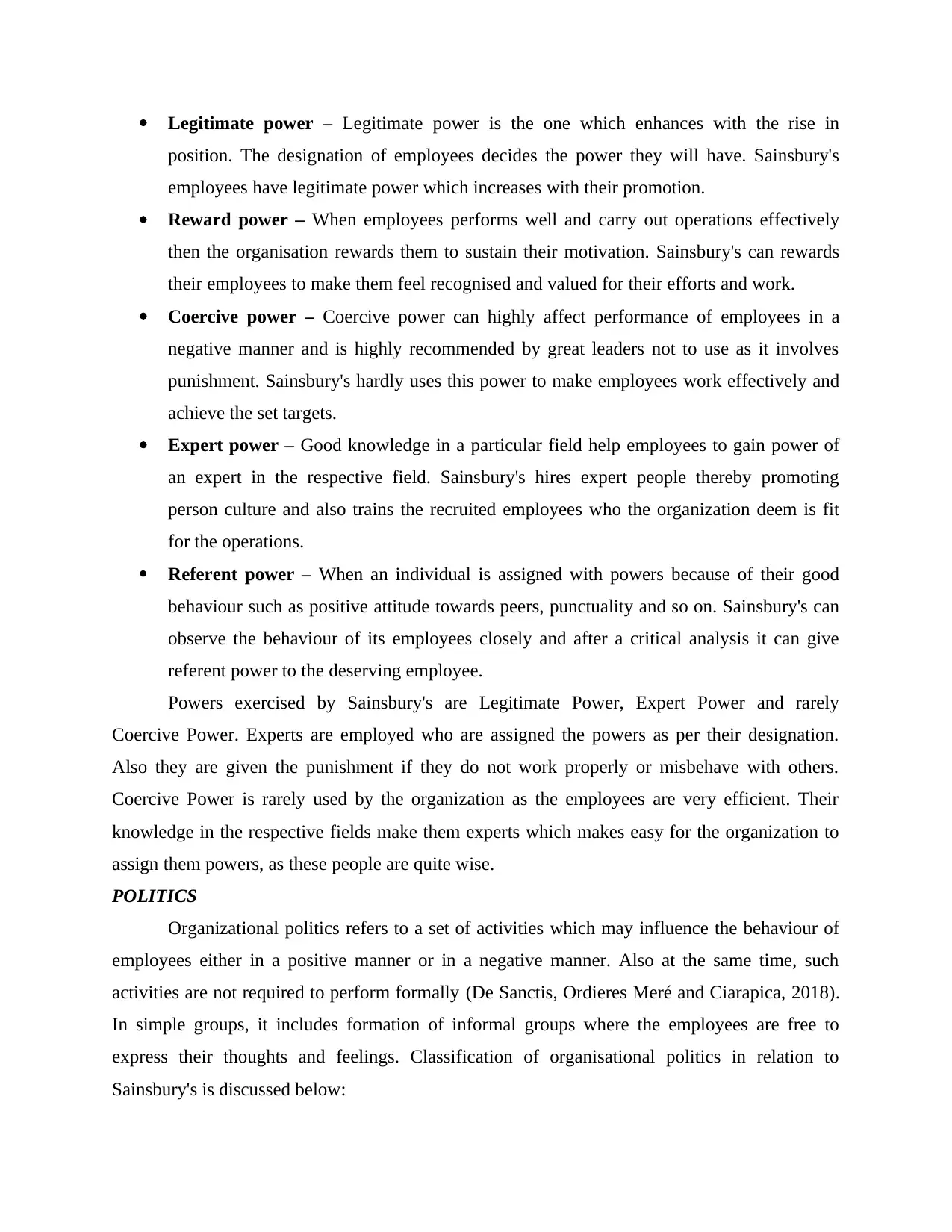
Legitimate power – Legitimate power is the one which enhances with the rise in
position. The designation of employees decides the power they will have. Sainsbury's
employees have legitimate power which increases with their promotion.
Reward power – When employees performs well and carry out operations effectively
then the organisation rewards them to sustain their motivation. Sainsbury's can rewards
their employees to make them feel recognised and valued for their efforts and work.
Coercive power – Coercive power can highly affect performance of employees in a
negative manner and is highly recommended by great leaders not to use as it involves
punishment. Sainsbury's hardly uses this power to make employees work effectively and
achieve the set targets.
Expert power – Good knowledge in a particular field help employees to gain power of
an expert in the respective field. Sainsbury's hires expert people thereby promoting
person culture and also trains the recruited employees who the organization deem is fit
for the operations.
Referent power – When an individual is assigned with powers because of their good
behaviour such as positive attitude towards peers, punctuality and so on. Sainsbury's can
observe the behaviour of its employees closely and after a critical analysis it can give
referent power to the deserving employee.
Powers exercised by Sainsbury's are Legitimate Power, Expert Power and rarely
Coercive Power. Experts are employed who are assigned the powers as per their designation.
Also they are given the punishment if they do not work properly or misbehave with others.
Coercive Power is rarely used by the organization as the employees are very efficient. Their
knowledge in the respective fields make them experts which makes easy for the organization to
assign them powers, as these people are quite wise.
POLITICS
Organizational politics refers to a set of activities which may influence the behaviour of
employees either in a positive manner or in a negative manner. Also at the same time, such
activities are not required to perform formally (De Sanctis, Ordieres Meré and Ciarapica, 2018).
In simple groups, it includes formation of informal groups where the employees are free to
express their thoughts and feelings. Classification of organisational politics in relation to
Sainsbury's is discussed below:
position. The designation of employees decides the power they will have. Sainsbury's
employees have legitimate power which increases with their promotion.
Reward power – When employees performs well and carry out operations effectively
then the organisation rewards them to sustain their motivation. Sainsbury's can rewards
their employees to make them feel recognised and valued for their efforts and work.
Coercive power – Coercive power can highly affect performance of employees in a
negative manner and is highly recommended by great leaders not to use as it involves
punishment. Sainsbury's hardly uses this power to make employees work effectively and
achieve the set targets.
Expert power – Good knowledge in a particular field help employees to gain power of
an expert in the respective field. Sainsbury's hires expert people thereby promoting
person culture and also trains the recruited employees who the organization deem is fit
for the operations.
Referent power – When an individual is assigned with powers because of their good
behaviour such as positive attitude towards peers, punctuality and so on. Sainsbury's can
observe the behaviour of its employees closely and after a critical analysis it can give
referent power to the deserving employee.
Powers exercised by Sainsbury's are Legitimate Power, Expert Power and rarely
Coercive Power. Experts are employed who are assigned the powers as per their designation.
Also they are given the punishment if they do not work properly or misbehave with others.
Coercive Power is rarely used by the organization as the employees are very efficient. Their
knowledge in the respective fields make them experts which makes easy for the organization to
assign them powers, as these people are quite wise.
POLITICS
Organizational politics refers to a set of activities which may influence the behaviour of
employees either in a positive manner or in a negative manner. Also at the same time, such
activities are not required to perform formally (De Sanctis, Ordieres Meré and Ciarapica, 2018).
In simple groups, it includes formation of informal groups where the employees are free to
express their thoughts and feelings. Classification of organisational politics in relation to
Sainsbury's is discussed below:
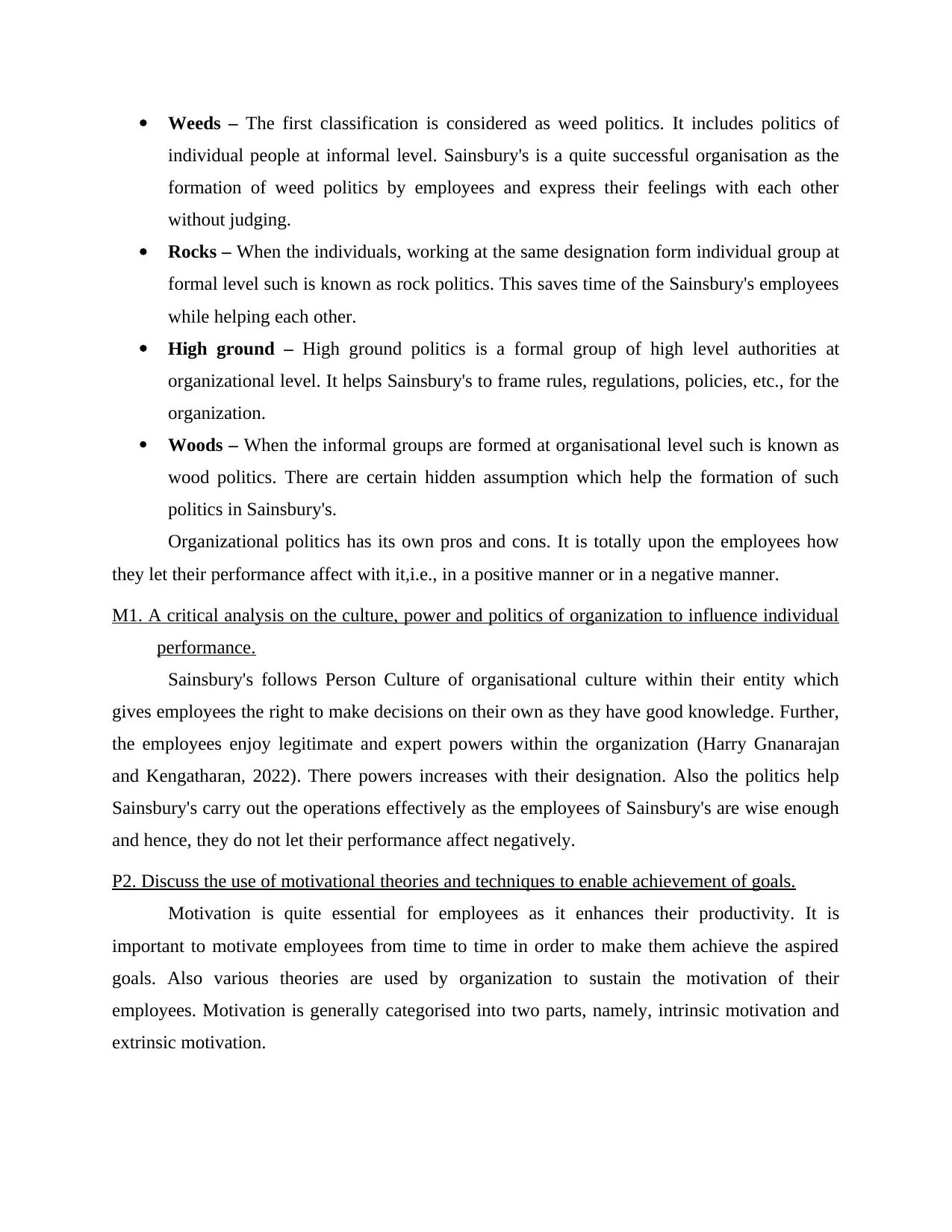
Weeds – The first classification is considered as weed politics. It includes politics of
individual people at informal level. Sainsbury's is a quite successful organisation as the
formation of weed politics by employees and express their feelings with each other
without judging.
Rocks – When the individuals, working at the same designation form individual group at
formal level such is known as rock politics. This saves time of the Sainsbury's employees
while helping each other.
High ground – High ground politics is a formal group of high level authorities at
organizational level. It helps Sainsbury's to frame rules, regulations, policies, etc., for the
organization.
Woods – When the informal groups are formed at organisational level such is known as
wood politics. There are certain hidden assumption which help the formation of such
politics in Sainsbury's.
Organizational politics has its own pros and cons. It is totally upon the employees how
they let their performance affect with it,i.e., in a positive manner or in a negative manner.
M1. A critical analysis on the culture, power and politics of organization to influence individual
performance.
Sainsbury's follows Person Culture of organisational culture within their entity which
gives employees the right to make decisions on their own as they have good knowledge. Further,
the employees enjoy legitimate and expert powers within the organization (Harry Gnanarajan
and Kengatharan, 2022). There powers increases with their designation. Also the politics help
Sainsbury's carry out the operations effectively as the employees of Sainsbury's are wise enough
and hence, they do not let their performance affect negatively.
P2. Discuss the use of motivational theories and techniques to enable achievement of goals.
Motivation is quite essential for employees as it enhances their productivity. It is
important to motivate employees from time to time in order to make them achieve the aspired
goals. Also various theories are used by organization to sustain the motivation of their
employees. Motivation is generally categorised into two parts, namely, intrinsic motivation and
extrinsic motivation.
individual people at informal level. Sainsbury's is a quite successful organisation as the
formation of weed politics by employees and express their feelings with each other
without judging.
Rocks – When the individuals, working at the same designation form individual group at
formal level such is known as rock politics. This saves time of the Sainsbury's employees
while helping each other.
High ground – High ground politics is a formal group of high level authorities at
organizational level. It helps Sainsbury's to frame rules, regulations, policies, etc., for the
organization.
Woods – When the informal groups are formed at organisational level such is known as
wood politics. There are certain hidden assumption which help the formation of such
politics in Sainsbury's.
Organizational politics has its own pros and cons. It is totally upon the employees how
they let their performance affect with it,i.e., in a positive manner or in a negative manner.
M1. A critical analysis on the culture, power and politics of organization to influence individual
performance.
Sainsbury's follows Person Culture of organisational culture within their entity which
gives employees the right to make decisions on their own as they have good knowledge. Further,
the employees enjoy legitimate and expert powers within the organization (Harry Gnanarajan
and Kengatharan, 2022). There powers increases with their designation. Also the politics help
Sainsbury's carry out the operations effectively as the employees of Sainsbury's are wise enough
and hence, they do not let their performance affect negatively.
P2. Discuss the use of motivational theories and techniques to enable achievement of goals.
Motivation is quite essential for employees as it enhances their productivity. It is
important to motivate employees from time to time in order to make them achieve the aspired
goals. Also various theories are used by organization to sustain the motivation of their
employees. Motivation is generally categorised into two parts, namely, intrinsic motivation and
extrinsic motivation.
⊘ This is a preview!⊘
Do you want full access?
Subscribe today to unlock all pages.

Trusted by 1+ million students worldwide
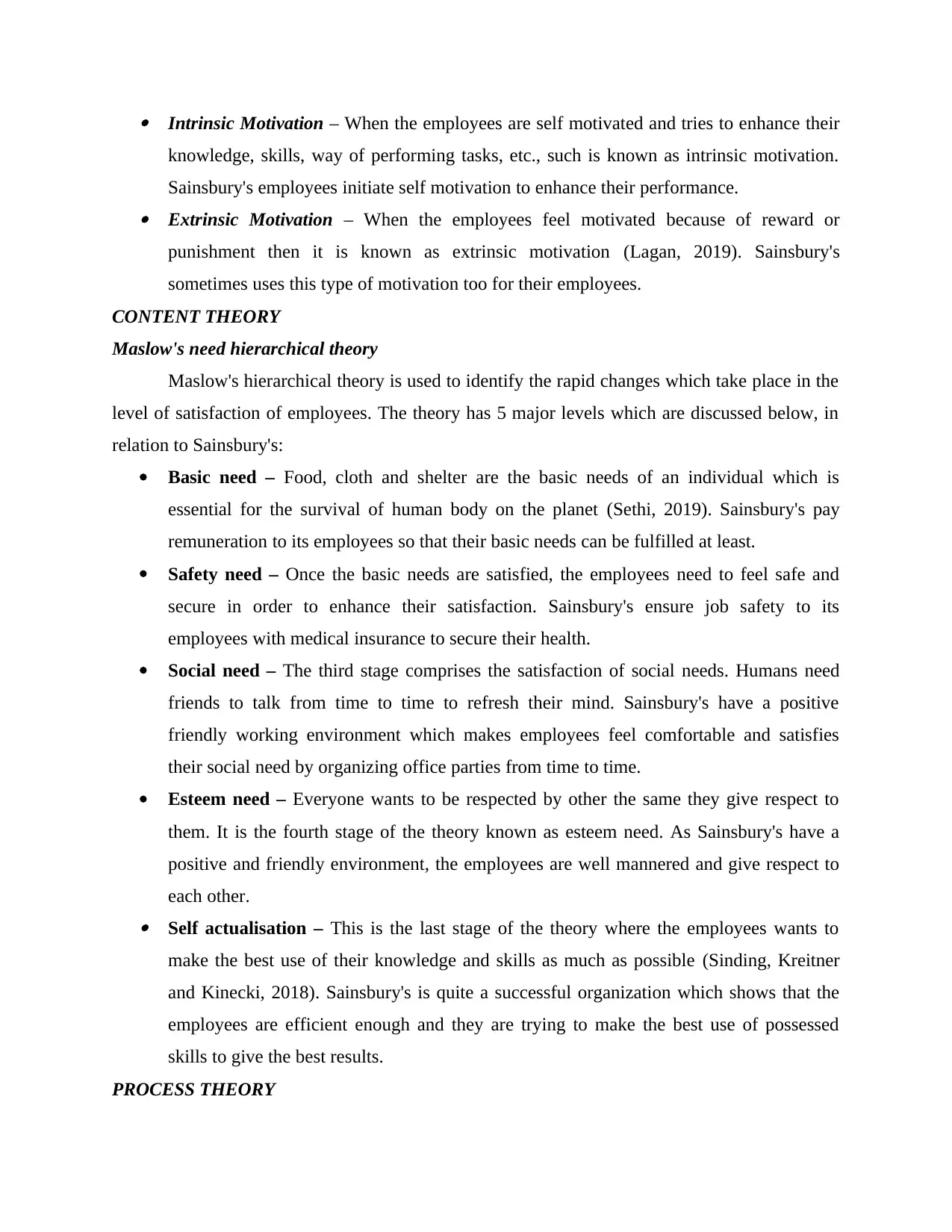
Intrinsic Motivation – When the employees are self motivated and tries to enhance their
knowledge, skills, way of performing tasks, etc., such is known as intrinsic motivation.
Sainsbury's employees initiate self motivation to enhance their performance. Extrinsic Motivation – When the employees feel motivated because of reward or
punishment then it is known as extrinsic motivation (Lagan, 2019). Sainsbury's
sometimes uses this type of motivation too for their employees.
CONTENT THEORY
Maslow's need hierarchical theory
Maslow's hierarchical theory is used to identify the rapid changes which take place in the
level of satisfaction of employees. The theory has 5 major levels which are discussed below, in
relation to Sainsbury's:
Basic need – Food, cloth and shelter are the basic needs of an individual which is
essential for the survival of human body on the planet (Sethi, 2019). Sainsbury's pay
remuneration to its employees so that their basic needs can be fulfilled at least.
Safety need – Once the basic needs are satisfied, the employees need to feel safe and
secure in order to enhance their satisfaction. Sainsbury's ensure job safety to its
employees with medical insurance to secure their health.
Social need – The third stage comprises the satisfaction of social needs. Humans need
friends to talk from time to time to refresh their mind. Sainsbury's have a positive
friendly working environment which makes employees feel comfortable and satisfies
their social need by organizing office parties from time to time.
Esteem need – Everyone wants to be respected by other the same they give respect to
them. It is the fourth stage of the theory known as esteem need. As Sainsbury's have a
positive and friendly environment, the employees are well mannered and give respect to
each other. Self actualisation – This is the last stage of the theory where the employees wants to
make the best use of their knowledge and skills as much as possible (Sinding, Kreitner
and Kinecki, 2018). Sainsbury's is quite a successful organization which shows that the
employees are efficient enough and they are trying to make the best use of possessed
skills to give the best results.
PROCESS THEORY
knowledge, skills, way of performing tasks, etc., such is known as intrinsic motivation.
Sainsbury's employees initiate self motivation to enhance their performance. Extrinsic Motivation – When the employees feel motivated because of reward or
punishment then it is known as extrinsic motivation (Lagan, 2019). Sainsbury's
sometimes uses this type of motivation too for their employees.
CONTENT THEORY
Maslow's need hierarchical theory
Maslow's hierarchical theory is used to identify the rapid changes which take place in the
level of satisfaction of employees. The theory has 5 major levels which are discussed below, in
relation to Sainsbury's:
Basic need – Food, cloth and shelter are the basic needs of an individual which is
essential for the survival of human body on the planet (Sethi, 2019). Sainsbury's pay
remuneration to its employees so that their basic needs can be fulfilled at least.
Safety need – Once the basic needs are satisfied, the employees need to feel safe and
secure in order to enhance their satisfaction. Sainsbury's ensure job safety to its
employees with medical insurance to secure their health.
Social need – The third stage comprises the satisfaction of social needs. Humans need
friends to talk from time to time to refresh their mind. Sainsbury's have a positive
friendly working environment which makes employees feel comfortable and satisfies
their social need by organizing office parties from time to time.
Esteem need – Everyone wants to be respected by other the same they give respect to
them. It is the fourth stage of the theory known as esteem need. As Sainsbury's have a
positive and friendly environment, the employees are well mannered and give respect to
each other. Self actualisation – This is the last stage of the theory where the employees wants to
make the best use of their knowledge and skills as much as possible (Sinding, Kreitner
and Kinecki, 2018). Sainsbury's is quite a successful organization which shows that the
employees are efficient enough and they are trying to make the best use of possessed
skills to give the best results.
PROCESS THEORY
Paraphrase This Document
Need a fresh take? Get an instant paraphrase of this document with our AI Paraphraser
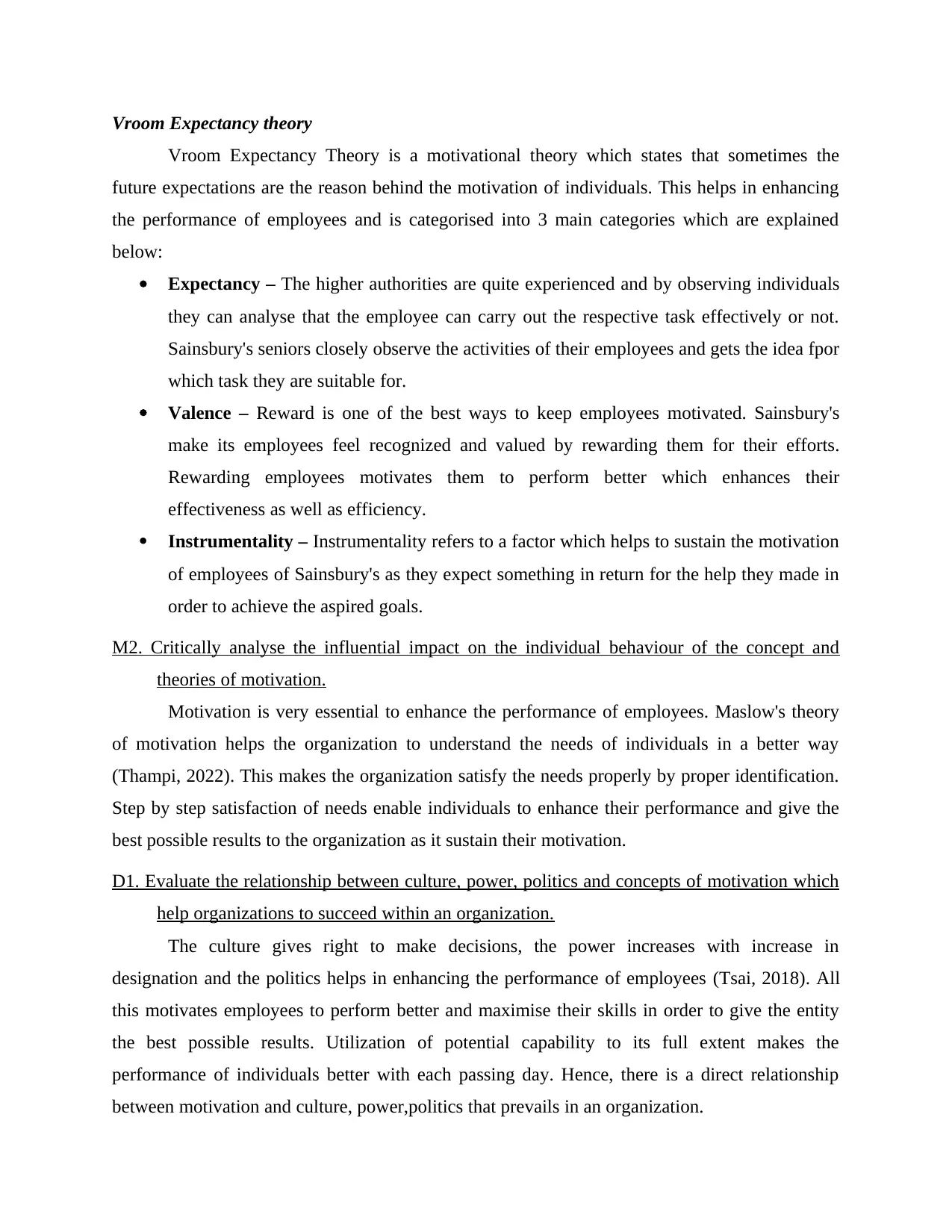
Vroom Expectancy theory
Vroom Expectancy Theory is a motivational theory which states that sometimes the
future expectations are the reason behind the motivation of individuals. This helps in enhancing
the performance of employees and is categorised into 3 main categories which are explained
below:
Expectancy – The higher authorities are quite experienced and by observing individuals
they can analyse that the employee can carry out the respective task effectively or not.
Sainsbury's seniors closely observe the activities of their employees and gets the idea fpor
which task they are suitable for.
Valence – Reward is one of the best ways to keep employees motivated. Sainsbury's
make its employees feel recognized and valued by rewarding them for their efforts.
Rewarding employees motivates them to perform better which enhances their
effectiveness as well as efficiency.
Instrumentality – Instrumentality refers to a factor which helps to sustain the motivation
of employees of Sainsbury's as they expect something in return for the help they made in
order to achieve the aspired goals.
M2. Critically analyse the influential impact on the individual behaviour of the concept and
theories of motivation.
Motivation is very essential to enhance the performance of employees. Maslow's theory
of motivation helps the organization to understand the needs of individuals in a better way
(Thampi, 2022). This makes the organization satisfy the needs properly by proper identification.
Step by step satisfaction of needs enable individuals to enhance their performance and give the
best possible results to the organization as it sustain their motivation.
D1. Evaluate the relationship between culture, power, politics and concepts of motivation which
help organizations to succeed within an organization.
The culture gives right to make decisions, the power increases with increase in
designation and the politics helps in enhancing the performance of employees (Tsai, 2018). All
this motivates employees to perform better and maximise their skills in order to give the entity
the best possible results. Utilization of potential capability to its full extent makes the
performance of individuals better with each passing day. Hence, there is a direct relationship
between motivation and culture, power,politics that prevails in an organization.
Vroom Expectancy Theory is a motivational theory which states that sometimes the
future expectations are the reason behind the motivation of individuals. This helps in enhancing
the performance of employees and is categorised into 3 main categories which are explained
below:
Expectancy – The higher authorities are quite experienced and by observing individuals
they can analyse that the employee can carry out the respective task effectively or not.
Sainsbury's seniors closely observe the activities of their employees and gets the idea fpor
which task they are suitable for.
Valence – Reward is one of the best ways to keep employees motivated. Sainsbury's
make its employees feel recognized and valued by rewarding them for their efforts.
Rewarding employees motivates them to perform better which enhances their
effectiveness as well as efficiency.
Instrumentality – Instrumentality refers to a factor which helps to sustain the motivation
of employees of Sainsbury's as they expect something in return for the help they made in
order to achieve the aspired goals.
M2. Critically analyse the influential impact on the individual behaviour of the concept and
theories of motivation.
Motivation is very essential to enhance the performance of employees. Maslow's theory
of motivation helps the organization to understand the needs of individuals in a better way
(Thampi, 2022). This makes the organization satisfy the needs properly by proper identification.
Step by step satisfaction of needs enable individuals to enhance their performance and give the
best possible results to the organization as it sustain their motivation.
D1. Evaluate the relationship between culture, power, politics and concepts of motivation which
help organizations to succeed within an organization.
The culture gives right to make decisions, the power increases with increase in
designation and the politics helps in enhancing the performance of employees (Tsai, 2018). All
this motivates employees to perform better and maximise their skills in order to give the entity
the best possible results. Utilization of potential capability to its full extent makes the
performance of individuals better with each passing day. Hence, there is a direct relationship
between motivation and culture, power,politics that prevails in an organization.
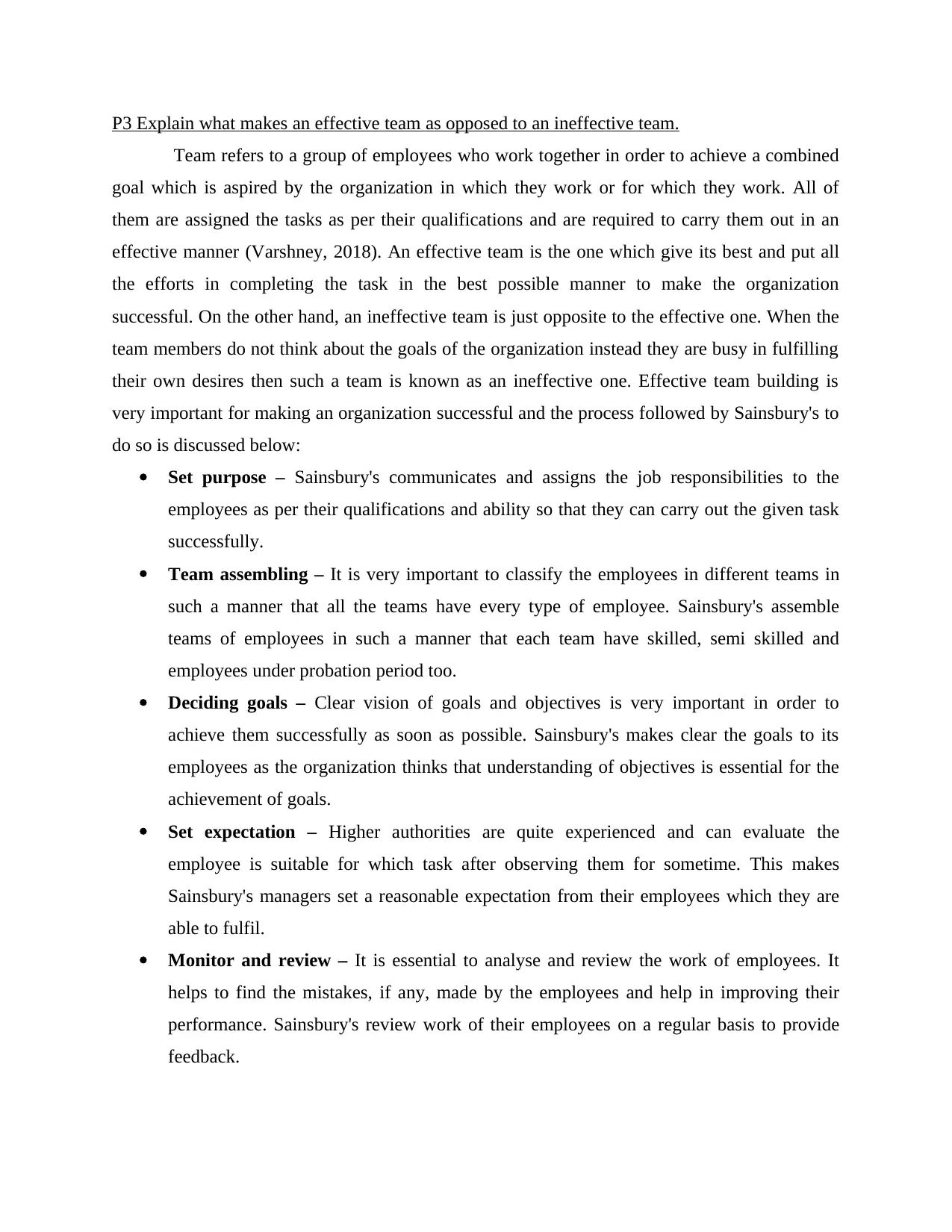
P3 Explain what makes an effective team as opposed to an ineffective team.
Team refers to a group of employees who work together in order to achieve a combined
goal which is aspired by the organization in which they work or for which they work. All of
them are assigned the tasks as per their qualifications and are required to carry them out in an
effective manner (Varshney, 2018). An effective team is the one which give its best and put all
the efforts in completing the task in the best possible manner to make the organization
successful. On the other hand, an ineffective team is just opposite to the effective one. When the
team members do not think about the goals of the organization instead they are busy in fulfilling
their own desires then such a team is known as an ineffective one. Effective team building is
very important for making an organization successful and the process followed by Sainsbury's to
do so is discussed below:
Set purpose – Sainsbury's communicates and assigns the job responsibilities to the
employees as per their qualifications and ability so that they can carry out the given task
successfully.
Team assembling – It is very important to classify the employees in different teams in
such a manner that all the teams have every type of employee. Sainsbury's assemble
teams of employees in such a manner that each team have skilled, semi skilled and
employees under probation period too.
Deciding goals – Clear vision of goals and objectives is very important in order to
achieve them successfully as soon as possible. Sainsbury's makes clear the goals to its
employees as the organization thinks that understanding of objectives is essential for the
achievement of goals.
Set expectation – Higher authorities are quite experienced and can evaluate the
employee is suitable for which task after observing them for sometime. This makes
Sainsbury's managers set a reasonable expectation from their employees which they are
able to fulfil.
Monitor and review – It is essential to analyse and review the work of employees. It
helps to find the mistakes, if any, made by the employees and help in improving their
performance. Sainsbury's review work of their employees on a regular basis to provide
feedback.
Team refers to a group of employees who work together in order to achieve a combined
goal which is aspired by the organization in which they work or for which they work. All of
them are assigned the tasks as per their qualifications and are required to carry them out in an
effective manner (Varshney, 2018). An effective team is the one which give its best and put all
the efforts in completing the task in the best possible manner to make the organization
successful. On the other hand, an ineffective team is just opposite to the effective one. When the
team members do not think about the goals of the organization instead they are busy in fulfilling
their own desires then such a team is known as an ineffective one. Effective team building is
very important for making an organization successful and the process followed by Sainsbury's to
do so is discussed below:
Set purpose – Sainsbury's communicates and assigns the job responsibilities to the
employees as per their qualifications and ability so that they can carry out the given task
successfully.
Team assembling – It is very important to classify the employees in different teams in
such a manner that all the teams have every type of employee. Sainsbury's assemble
teams of employees in such a manner that each team have skilled, semi skilled and
employees under probation period too.
Deciding goals – Clear vision of goals and objectives is very important in order to
achieve them successfully as soon as possible. Sainsbury's makes clear the goals to its
employees as the organization thinks that understanding of objectives is essential for the
achievement of goals.
Set expectation – Higher authorities are quite experienced and can evaluate the
employee is suitable for which task after observing them for sometime. This makes
Sainsbury's managers set a reasonable expectation from their employees which they are
able to fulfil.
Monitor and review – It is essential to analyse and review the work of employees. It
helps to find the mistakes, if any, made by the employees and help in improving their
performance. Sainsbury's review work of their employees on a regular basis to provide
feedback.
⊘ This is a preview!⊘
Do you want full access?
Subscribe today to unlock all pages.

Trusted by 1+ million students worldwide
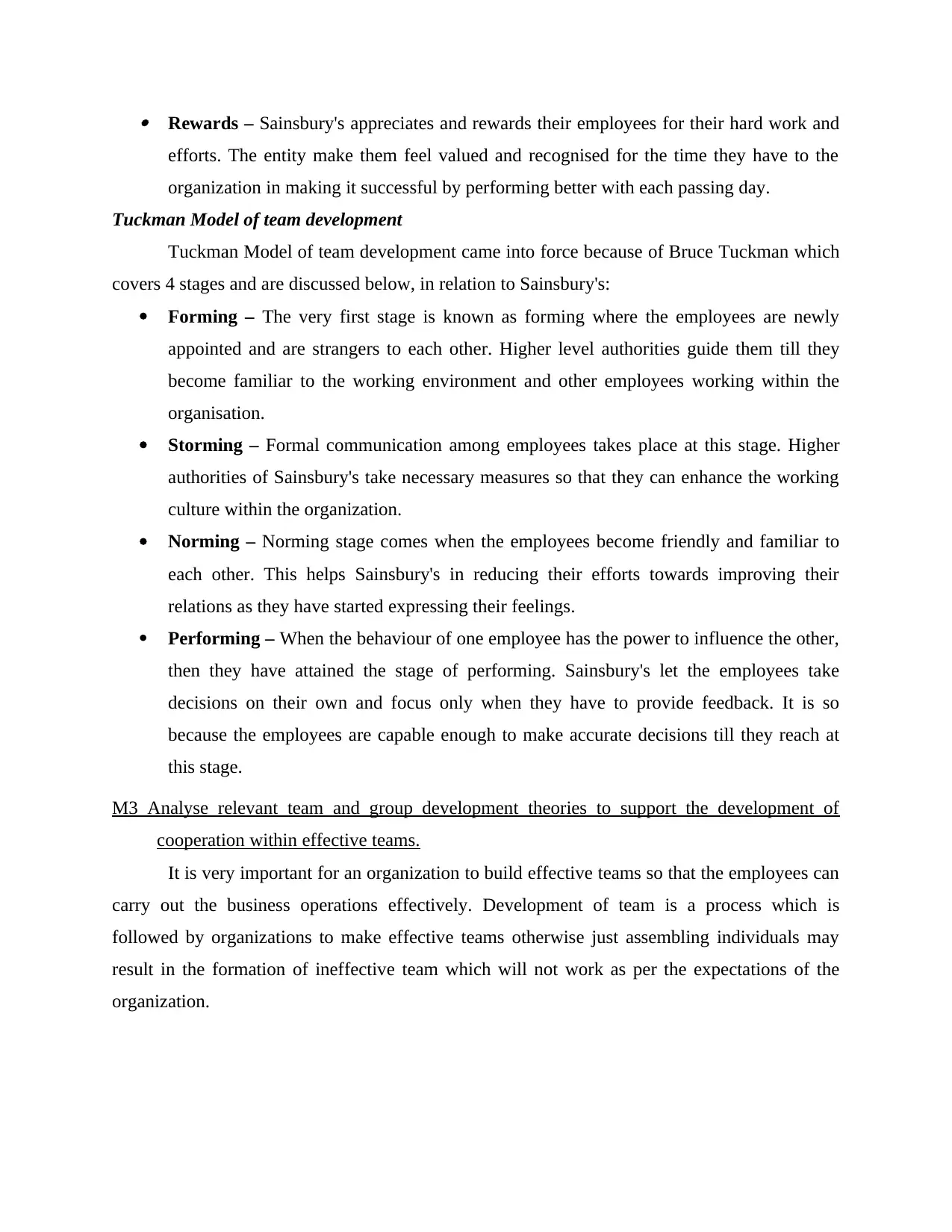
Rewards – Sainsbury's appreciates and rewards their employees for their hard work and
efforts. The entity make them feel valued and recognised for the time they have to the
organization in making it successful by performing better with each passing day.
Tuckman Model of team development
Tuckman Model of team development came into force because of Bruce Tuckman which
covers 4 stages and are discussed below, in relation to Sainsbury's:
Forming – The very first stage is known as forming where the employees are newly
appointed and are strangers to each other. Higher level authorities guide them till they
become familiar to the working environment and other employees working within the
organisation.
Storming – Formal communication among employees takes place at this stage. Higher
authorities of Sainsbury's take necessary measures so that they can enhance the working
culture within the organization.
Norming – Norming stage comes when the employees become friendly and familiar to
each other. This helps Sainsbury's in reducing their efforts towards improving their
relations as they have started expressing their feelings.
Performing – When the behaviour of one employee has the power to influence the other,
then they have attained the stage of performing. Sainsbury's let the employees take
decisions on their own and focus only when they have to provide feedback. It is so
because the employees are capable enough to make accurate decisions till they reach at
this stage.
M3 Analyse relevant team and group development theories to support the development of
cooperation within effective teams.
It is very important for an organization to build effective teams so that the employees can
carry out the business operations effectively. Development of team is a process which is
followed by organizations to make effective teams otherwise just assembling individuals may
result in the formation of ineffective team which will not work as per the expectations of the
organization.
efforts. The entity make them feel valued and recognised for the time they have to the
organization in making it successful by performing better with each passing day.
Tuckman Model of team development
Tuckman Model of team development came into force because of Bruce Tuckman which
covers 4 stages and are discussed below, in relation to Sainsbury's:
Forming – The very first stage is known as forming where the employees are newly
appointed and are strangers to each other. Higher level authorities guide them till they
become familiar to the working environment and other employees working within the
organisation.
Storming – Formal communication among employees takes place at this stage. Higher
authorities of Sainsbury's take necessary measures so that they can enhance the working
culture within the organization.
Norming – Norming stage comes when the employees become friendly and familiar to
each other. This helps Sainsbury's in reducing their efforts towards improving their
relations as they have started expressing their feelings.
Performing – When the behaviour of one employee has the power to influence the other,
then they have attained the stage of performing. Sainsbury's let the employees take
decisions on their own and focus only when they have to provide feedback. It is so
because the employees are capable enough to make accurate decisions till they reach at
this stage.
M3 Analyse relevant team and group development theories to support the development of
cooperation within effective teams.
It is very important for an organization to build effective teams so that the employees can
carry out the business operations effectively. Development of team is a process which is
followed by organizations to make effective teams otherwise just assembling individuals may
result in the formation of ineffective team which will not work as per the expectations of the
organization.
Paraphrase This Document
Need a fresh take? Get an instant paraphrase of this document with our AI Paraphraser
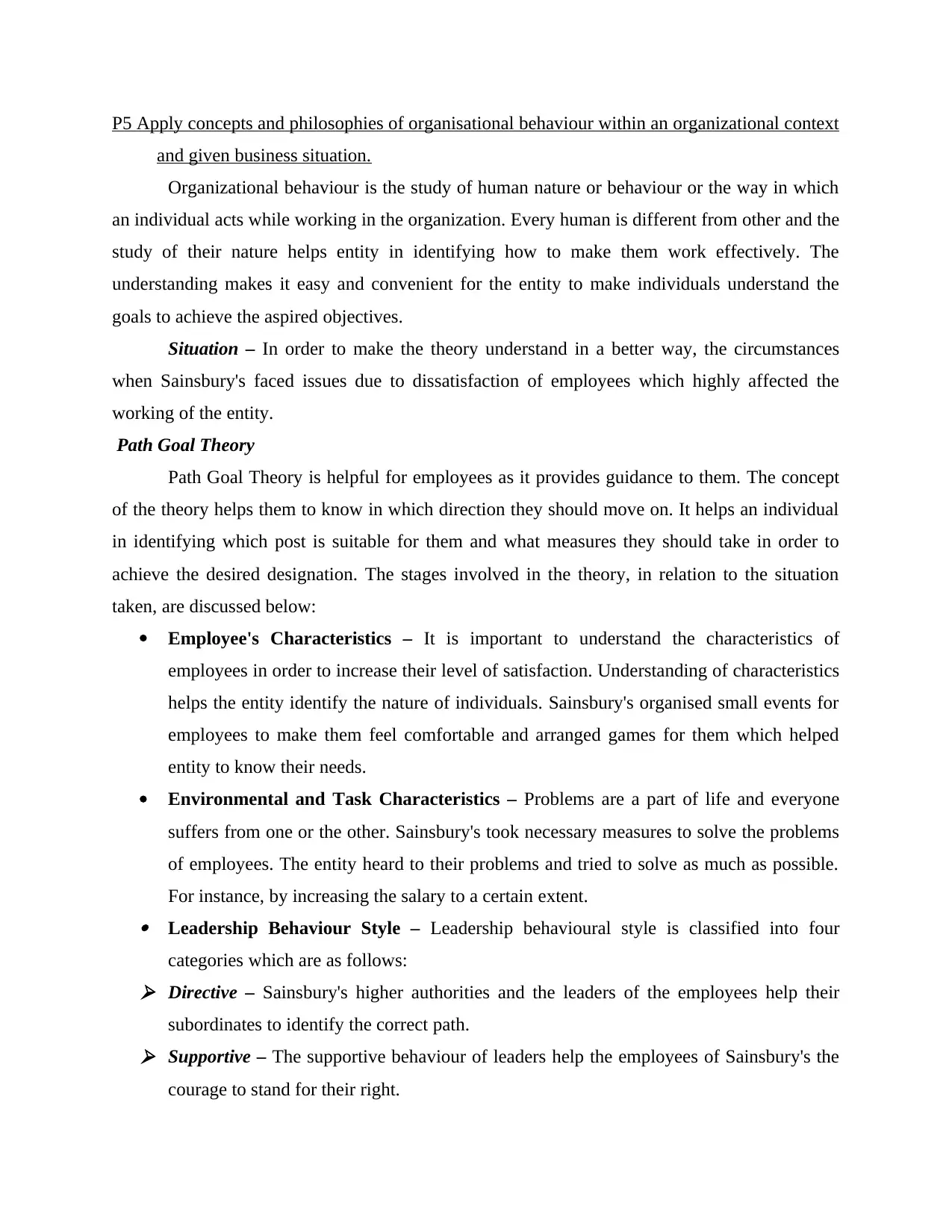
P5 Apply concepts and philosophies of organisational behaviour within an organizational context
and given business situation.
Organizational behaviour is the study of human nature or behaviour or the way in which
an individual acts while working in the organization. Every human is different from other and the
study of their nature helps entity in identifying how to make them work effectively. The
understanding makes it easy and convenient for the entity to make individuals understand the
goals to achieve the aspired objectives.
Situation – In order to make the theory understand in a better way, the circumstances
when Sainsbury's faced issues due to dissatisfaction of employees which highly affected the
working of the entity.
Path Goal Theory
Path Goal Theory is helpful for employees as it provides guidance to them. The concept
of the theory helps them to know in which direction they should move on. It helps an individual
in identifying which post is suitable for them and what measures they should take in order to
achieve the desired designation. The stages involved in the theory, in relation to the situation
taken, are discussed below:
Employee's Characteristics – It is important to understand the characteristics of
employees in order to increase their level of satisfaction. Understanding of characteristics
helps the entity identify the nature of individuals. Sainsbury's organised small events for
employees to make them feel comfortable and arranged games for them which helped
entity to know their needs.
Environmental and Task Characteristics – Problems are a part of life and everyone
suffers from one or the other. Sainsbury's took necessary measures to solve the problems
of employees. The entity heard to their problems and tried to solve as much as possible.
For instance, by increasing the salary to a certain extent. Leadership Behaviour Style – Leadership behavioural style is classified into four
categories which are as follows: Directive – Sainsbury's higher authorities and the leaders of the employees help their
subordinates to identify the correct path. Supportive – The supportive behaviour of leaders help the employees of Sainsbury's the
courage to stand for their right.
and given business situation.
Organizational behaviour is the study of human nature or behaviour or the way in which
an individual acts while working in the organization. Every human is different from other and the
study of their nature helps entity in identifying how to make them work effectively. The
understanding makes it easy and convenient for the entity to make individuals understand the
goals to achieve the aspired objectives.
Situation – In order to make the theory understand in a better way, the circumstances
when Sainsbury's faced issues due to dissatisfaction of employees which highly affected the
working of the entity.
Path Goal Theory
Path Goal Theory is helpful for employees as it provides guidance to them. The concept
of the theory helps them to know in which direction they should move on. It helps an individual
in identifying which post is suitable for them and what measures they should take in order to
achieve the desired designation. The stages involved in the theory, in relation to the situation
taken, are discussed below:
Employee's Characteristics – It is important to understand the characteristics of
employees in order to increase their level of satisfaction. Understanding of characteristics
helps the entity identify the nature of individuals. Sainsbury's organised small events for
employees to make them feel comfortable and arranged games for them which helped
entity to know their needs.
Environmental and Task Characteristics – Problems are a part of life and everyone
suffers from one or the other. Sainsbury's took necessary measures to solve the problems
of employees. The entity heard to their problems and tried to solve as much as possible.
For instance, by increasing the salary to a certain extent. Leadership Behaviour Style – Leadership behavioural style is classified into four
categories which are as follows: Directive – Sainsbury's higher authorities and the leaders of the employees help their
subordinates to identify the correct path. Supportive – The supportive behaviour of leaders help the employees of Sainsbury's the
courage to stand for their right.
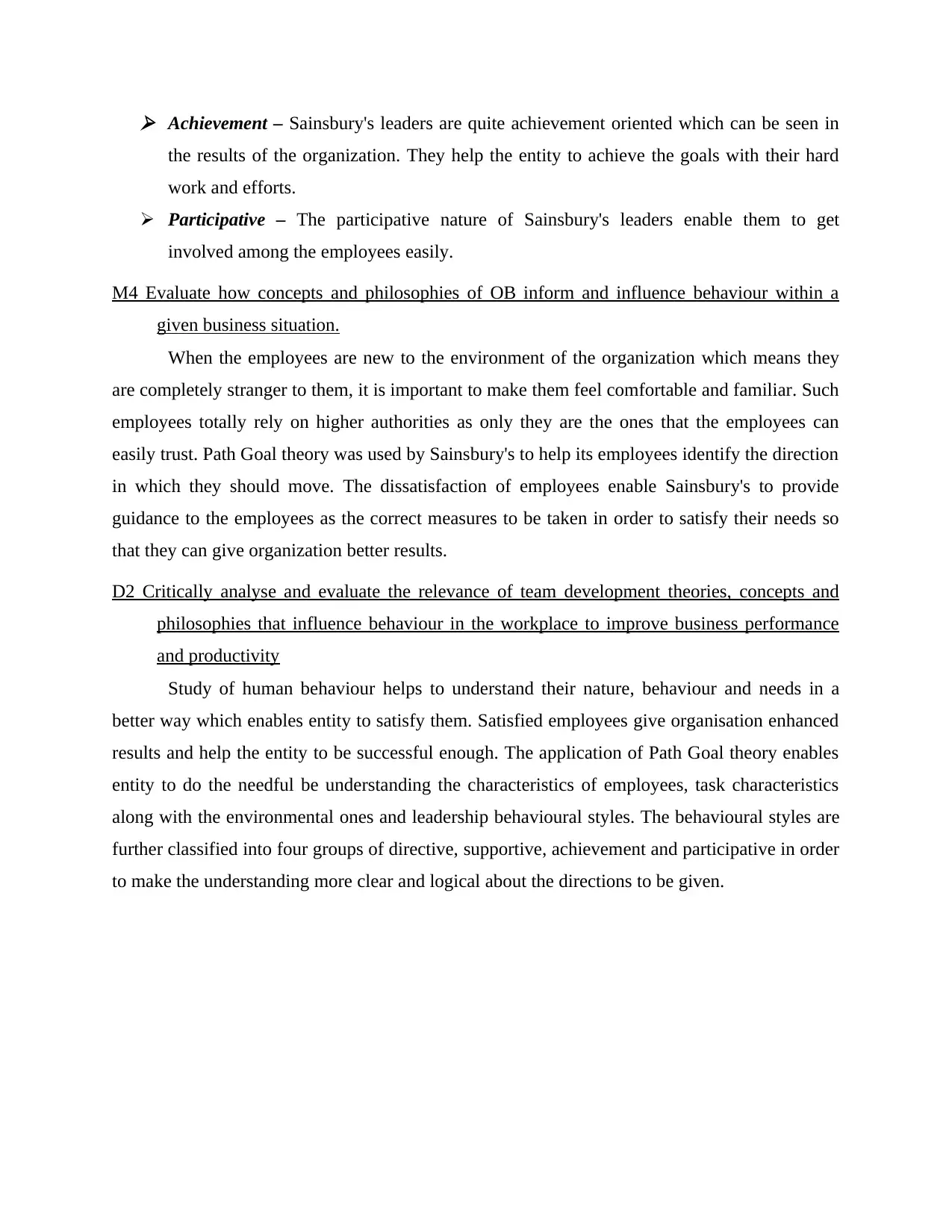
Achievement – Sainsbury's leaders are quite achievement oriented which can be seen in
the results of the organization. They help the entity to achieve the goals with their hard
work and efforts.
Participative – The participative nature of Sainsbury's leaders enable them to get
involved among the employees easily.
M4 Evaluate how concepts and philosophies of OB inform and influence behaviour within a
given business situation.
When the employees are new to the environment of the organization which means they
are completely stranger to them, it is important to make them feel comfortable and familiar. Such
employees totally rely on higher authorities as only they are the ones that the employees can
easily trust. Path Goal theory was used by Sainsbury's to help its employees identify the direction
in which they should move. The dissatisfaction of employees enable Sainsbury's to provide
guidance to the employees as the correct measures to be taken in order to satisfy their needs so
that they can give organization better results.
D2 Critically analyse and evaluate the relevance of team development theories, concepts and
philosophies that influence behaviour in the workplace to improve business performance
and productivity
Study of human behaviour helps to understand their nature, behaviour and needs in a
better way which enables entity to satisfy them. Satisfied employees give organisation enhanced
results and help the entity to be successful enough. The application of Path Goal theory enables
entity to do the needful be understanding the characteristics of employees, task characteristics
along with the environmental ones and leadership behavioural styles. The behavioural styles are
further classified into four groups of directive, supportive, achievement and participative in order
to make the understanding more clear and logical about the directions to be given.
the results of the organization. They help the entity to achieve the goals with their hard
work and efforts.
Participative – The participative nature of Sainsbury's leaders enable them to get
involved among the employees easily.
M4 Evaluate how concepts and philosophies of OB inform and influence behaviour within a
given business situation.
When the employees are new to the environment of the organization which means they
are completely stranger to them, it is important to make them feel comfortable and familiar. Such
employees totally rely on higher authorities as only they are the ones that the employees can
easily trust. Path Goal theory was used by Sainsbury's to help its employees identify the direction
in which they should move. The dissatisfaction of employees enable Sainsbury's to provide
guidance to the employees as the correct measures to be taken in order to satisfy their needs so
that they can give organization better results.
D2 Critically analyse and evaluate the relevance of team development theories, concepts and
philosophies that influence behaviour in the workplace to improve business performance
and productivity
Study of human behaviour helps to understand their nature, behaviour and needs in a
better way which enables entity to satisfy them. Satisfied employees give organisation enhanced
results and help the entity to be successful enough. The application of Path Goal theory enables
entity to do the needful be understanding the characteristics of employees, task characteristics
along with the environmental ones and leadership behavioural styles. The behavioural styles are
further classified into four groups of directive, supportive, achievement and participative in order
to make the understanding more clear and logical about the directions to be given.
⊘ This is a preview!⊘
Do you want full access?
Subscribe today to unlock all pages.

Trusted by 1+ million students worldwide
1 out of 14
Related Documents
Your All-in-One AI-Powered Toolkit for Academic Success.
+13062052269
info@desklib.com
Available 24*7 on WhatsApp / Email
![[object Object]](/_next/static/media/star-bottom.7253800d.svg)
Unlock your academic potential
Copyright © 2020–2026 A2Z Services. All Rights Reserved. Developed and managed by ZUCOL.




